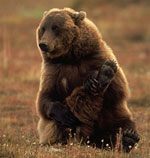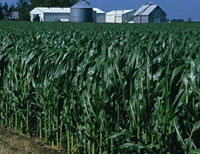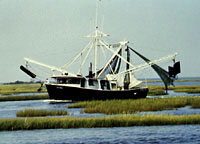
Not beary funny.
Photo: Art Wolfe, Inc.
I’ve heard the joke about the bear before, and so, probably, have you. Two guys are sitting outside their tent in a forest campsite when they see a huge angry bear charging toward them. One starts lacing up his running shoes. The other says, “Are you crazy? You’ll never outrun that bear!” The first says, “I don’t have to outrun the bear. I only have to outrun you.”
Ha ha — kind of sick humor, really, down the memory hole it goes with all the other jokes. But recently it came back up for me in a setting that got me to keep thinking about it.
It was a meeting about the future of the forest industry. We were talking about the rapid growth of sawmills in New England. We were wondering whether the forest can grow trees fast enough to supply the rising capacity of the mills. Wondering whether mill owners ask that question before they expand. Wondering what would happen if (or when) the mills, through their independent expansion decisions, collectively outgrow the forest.
Folks who know the industry well were saying, in effect, that the mills expand because they have to, to adopt new labor-saving and wood-saving technology, to cut costs, to underbid each other in the marketplace. They can’t know the expansion plans of other mills until those plans are underway. They have no way of tracking the combined wood demand of all mills against the total supply capacity of the forest. They only know that if, by expanding, they can cut their costs, then they can survive to expand again. If they fall behind, a bigger, cheaper mill takes their business. Grow or die.
That’s when an experienced forester told the joke about the bear. It cut deep, because we’ve been hearing the same story in other contexts.

Corn-ing the market.
Corn farmers in the Midwest, who get corn yields that are the envy of the world, will do or buy just about anything that will help them grow more corn. Fertilizer, herbicide, pesticide, gene-spliced seed, newfangled tractor, more land — whatever boosts output, they go for it.
They also know — it’s amazing to hear every blessed one of them say it — that as they put more corn on the market, the price of corn goes down, down, down. The more corn they grow, the lower the price, and the more they have to grow just to make the same income. They’re on a treadmill that no one is turning but them. Each one knows that if she’s the first to adopt the new technology, her yield gets a bit ahead of the others, and she survives. If she doesn’t, hers is the next farm on the auction block.
You don’t have to beat the bear, you just have to beat the other poor suckers who are trying to beat the bear.

A shrimp trawler in the Gulf of Mexico.
Photo: Barataria-Terrebonne National Estuary Program.
You can see the same thing happening with shrimp fishing fleets in the Gulf of Mexico. Everyone there, from the fisheries experts to the guys working on the boats, seems to agree that there are about 30 percent more trawlers out in the Gulf than there should be for the fishery to be profitable. Another way to say this is, 30 percent of the time they lose money fishing and would be better off staying ashore.
Because shrimp are wonderfully prolific, this boat excess doesn’t appear to be wiping out the resource — yet, anyway. (That is happening in dozens of other fisheries.) It is just wiping out profits. Yet every fleet captain puts all he can into bigger, faster, more efficient boats to beat the other guys to that limited supply of shrimp. Since the resource is used to capacity, for every boat that catches more, another catches less. Grow or die.
One sick joke applies to three very different industries. Probably many other industries as well.
Even in these three I know, the cost of trying to outrun the other guy to escape the bear is immense. There’s the wasted investment, the idled machines, the laid-off workers, the bankrupt families, the dying communities. There’s the incalculable environmental cost of pushing a resource to, or beyond, its limit. The northeast forest has spreading clear-cuts and ever-younger trees. The seafloor of the Gulf of Mexico is constantly plowed up by shrimp trawlers. Tons of bycatch, young fish of many species, are dumped out dead from shrimp nets. Millions of dollars worth of fertilizers and pesticides wash off cornfields into the wells and streams of the Mississippi watershed.
Somehow we have created an economy that keeps our most basic and necessary producers on the edge of ruin, living in fear, preying on each other, wasting financial, human, social, and natural assets at an enormous rate.
If we had just a minute to think, might it not be wiser to stop racing each other against disaster, and start working together to address the problem of the bear?

